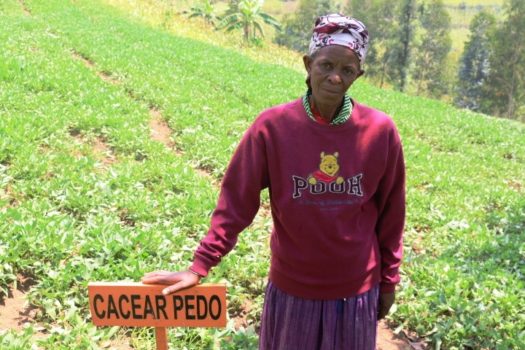By Aime Ndayisenga and Kirimi Sindi
It’s always difficult to try something new! Doubts, fear and the confidence you have gained over long experience with things you are familiar with, are the main motive of that inner resistance to jump into new ventures. This is common with business people and farmers. This is because farmers are risk averse and will only invest in something that they know will give them a good harvest. That is the reason it is difficult for farmers to adopt new technologies. The same scenario happened to Mukaruhirwa Madeline, a 54 years and grand-mother of 3 young children.

Madalena resides in Bugeyo village of Kinoni Sector, deep in Burera District about 25 Kms away from Musanze the headquarters of Nothern Province. Madeline has been farming for over 40 years. Her main crops over the four decades have not changed much. She grows beans, maize, sorghum and local sweetpotato. Usually her family of 6 people is able to grow enough crops for their family consumption with little surplus. They are even lucky to have enough food grown to last them to the next harvest. Therefore, over the year there is usually little to sell to the market.
Since October 2015, Madeline received new sweetpotato varieties from the Orange Fleshed Sweetpotato (OFSP) for income and Nutrition Activity implemented in her district by the International Potato Center (CIP) and DERN a local Catholic NGO funded by the Feed the Future program of United States Agency for International Development (USAID). As a small scale farmer she had never grown any other crop as a cash crop a part from maize and beans.
Through the project she introduced OFSP into her cropping pattern. This is after being educated of OFSP nutritional benefits through the project. However, she was risk averse and did not trust that the new sweetpotato varieties will give her enough food because of the limited land available for crops in Rwanda. Rwandan households have an average of 0.7 hectares per households.

Therefore, it is natural to grow only a crop and seeds that have been faithful over the years.
When interviewed she confessed with a smile “I had trouble accepting to grow these new OFSP varieties. Everyone in my village doubts trying any new seed. We have faith in our local-grown and selected seeds”. However, after trying the OFSP varieties she confessed “The good thing with this kind of seeds, is that you can never die of hunger as you harvest after 3 and half months. We farmers, like the short-season crops because they help us survive throughout the year.”
One of the components of the project is training beneficiaries how to process Orange Fleshed
Sweetpotatoes into various products using locally available household utensils. They bake like Mandazi (doughnuts), bread, chapatti and many other nutritious foods.
Madeline’s family used to buys doughnuts from the local market. On average they bought 60 doughnuts at a cost of 100 Rwf each per month.
After the training she decided to produce her own at home. This training was given by DERN and CIP. Madeline makes enough doughnuts for her grandchildren and supplies some to the market. She finds that adding value to roots is even more profitable compared to selling only roots to the market. In the last growing season, Madeline managed to earn 50,000 Rwf (US $63) from OFSP vines. She also sold 700 pieces of doughnuts at Rwf 100 to a total of Rwf 70,000 (US $ 88) at the local market. With the money she earned from sweetpotato farming in 2016, she was able to buy a hybrid cow whose organic manure will be an extra input for her farming activities.

As we concluded our interview, Madeline regretted her resistance to adopt Orange Fleshed Sweetpotatoes. She is determined to invest a bigger piece of land to increase the area under OFSP next season where she will be focusing on vine multiplication, as neighbors keep knocking the door asking for vines to buy.
